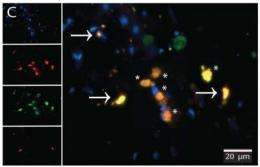How immune system, inflammation may play role in Lou Gehrig's disease

In an early study, UCLA researchers found that the immune cells of patients with amyotrophic lateral sclerosis (ALS), or Lou Gehrig's disease, may play a role in damaging the neurons in the spinal cord. ALS is a disease of the nerve cells in the brain and spinal cord that control voluntary muscle movement.
Specifically, the team found that inflammation instigated by the immune system in ALS can trigger macrophages — cells responsible for gobbling up waste products in the brain and body — to also ingest healthy neurons. During the inflammation process, motor neurons, whether healthy or not, are marked for clean-up by the macrophages.
In addition, the team found that a lipid mediator called resolvin D1, which is made in the body from the omega-3 fatty acid DHA, was able to "turn off" the inflammatory response that made the macrophages so dangerous to the neurons. Resolvin D1 blocked the inflammatory proteins being produced by the macrophages, curbing the inflammation process that marked the neurons for clean-up. It inhibited key inflammatory proteins like IL-6 with a potency 1,100 times greater than the parent molecule, DHA. DHA has been shown in studies to be neuroprotective in a number of conditions, including stroke and Alzheimer's disease.
For the study, the team isolated macrophages from blood samples taken from both ALS patients and controls and spinal cord cells from deceased donors.
The study findings on resolvin D1 may offer a new approach to attenuating the inflammation in ALS. Currently, there is no effective way of administering resolvins to patients, so clinical research with resolvin D1 is still several years away. The parent molecule, DHA, is available in stores, although it has not been tested in clinical trials for ALS. Studies with DHA are in progress for Alzheimer's disease, stroke and brain injury and have been mostly positive.
The research appeared in the May 30 edition of the peer-reviewed American Journal of Neurodegeneration.















